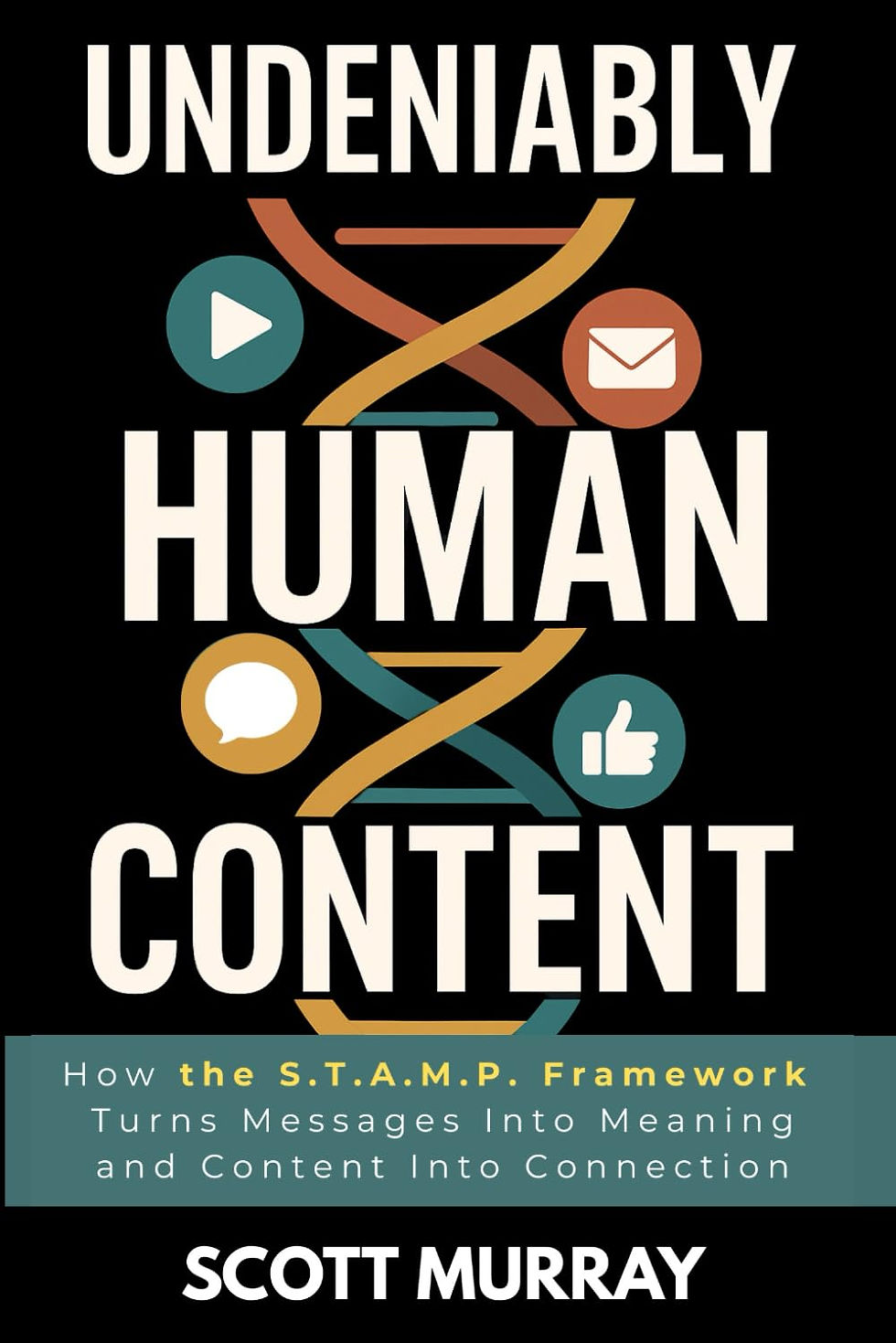What Happens When Real Estate Starts Humanizing Its Content?
- Scott Murray
- Jul 9
- 6 min read
Updated: Aug 3

While many brands are just beginning to humanize their content, some have always had a head start—because being human-focused has been a core part of their industry from the beginning. The real estate industry is one of them, but that doesn't mean they're free of challenges at a time when all brands should be focused on humanized content.
If you work in the real estate industry, here are some ways you can stand out and make a deeper connection with the people you're trying to serve.
Ask Key Questions Before Creating Your Content
Like in any industry, real estate content is full of words, clichés, ideas, and creative habits that are repeated so often that buyers barely notice them anymore.
So, stop and ask yourself questions, like:
Why am I about to create content about this?
Is there a reason I’m about to create the content in this particular way?
Is it possible I'm repeating something my consumers have seen too much?
If I were a buyer, what would I want to see/hear/learn?
Real Estate Thought Leader Brian Icenhower recently listed eight social media mistakes that are killing real estate businesses. One of these mistakes includes what he calls "Flex Culture."

He said, "We’ve got all these agents out there talking about passive income, jets and luxury lifestyles—trying to get other agents to follow them.” He points out it's not content focused on the consumer, but instead, it's very "agent-centric."
Posts like these are not only designed to get engagement, but also demonstrate a form of social proof as a "successful" agent. After all, look at what they're showing you in the post.
Real estate influencer Tom Panos said this has been a trend he's witnessed in the last 20 years, in which real estate professionals "moved away from making the hero be the client and all of a sudden the real estate agent decides to be the hero in the transaction.”
I've actually wondered about this concept when I see attorneys promote themselves with visuals of them on private jets or in other extravagant ways, all while looking stoic, tough, and in some ways...unapproachable.

I can't help but wonder if that can work against them (especially that unapproachable feeling). The other thing I wonder is if a real estate agent (or attorney) turned off their "work brains" and shifted more to their "consumer-in-need brains," if it would be easier to determine better ways to connect and resonate with people.
It all starts with questions both sides might be asking about the content.

Recognizing Old "Clichés"
One of the best ways to help your content stand out and resonate with audiences is by considering what has been over-repeated in your industry. Part of this requires recognizing when your approach to content relies on outdated “marketing science” instead of something relatable.
For example, every industry has its buzzwords and default content styles that become automatic over time. So automatic that we stop noticing how long we've been doing the same thing—or worse, how often our audience has seen it all before.
When it comes to specific words used in the real estate industry, you might think about "luxury," "rare," "nestled," "private enclave," "natural landscaping," "respected developer," "cozy," "fantastic," "charming," and "wonderful" as some of the most common real estate clichés out there. You may not realize how much you use them - but your consumers do.
A lot of people struggle to break free from words that have become overly common in their industries. In the education space, it might be the word "student-centric."

In healthcare, consumers see content claiming that a hospital or doctor "cares." Is that a differentiator? What hospital or doctor DOESN'T care? If it's tough to come up with different words, then healthcare professionals have to define what those words mean and how they differ from other healthcare providers..
Your Words vs. Their Takeaway
One of the reasons it's beneficial to have relationships with clients and take the time to talk with buyers regularly is to understand how they think, particularly in terms of language.
For example, today's realtors are encouraged to consider how consumers interpret, react to, and feel about common words used to describe a property. According to Alliance Title and Escrow:
What does the word COZY mean?
To realtors: A warm, inviting space where you can curl up with a book or relax in another way.

To buyers: Tiny. Like, “Can I open my closet door without hitting the bed?” tiny.

Another example?
“Charming”
"A storybook home with tons of character"
vs.
"Quirky. And not always in a good way. Think uneven floors, a strange layout or funky finishes that are… an acquired taste."
Tony Robbins points out that English has about 500,000 words, but most people use only 2,000 of them regularly, which is just 0.5% of the total. So, there is plenty of room to tap into new words or descriptions.
When we consider how consumers demand more brands and businesses communicate more like humans, that gives you a great place to start. It means getting away from what might sound like good "marketing copy" and evolving more towards the way we talk to one another.
The team at Radiant Copywriting points out that real estate listings can sound "uniform" and end up meaning nothing to the consumer - costing you business opportunities. And they say you should:
Consider whether words like "luxury" mean the same thing to your buyer - Unless you can specifically prove or demonstrate what makes a property one of "luxury," you're better off providing a description and letting the buyer decide if they think it's "luxurious."
Consider buyer experiences that make words mean something else - "Nestled in" might sound like the perfect way to generate some emotional appeal, but experience has taught buyers it likely means the property is "far away or in an otherwise hard-to-access location." So, consider potential buyer interpretations when selecting specific words for your property descriptions.
Consider the words used to describe the realtor - Just like overused terms such as “expert,” “trusted advisor,” and “industry leader” have lost their impact from repetition, phrases like “respected developer” have the same numbing effect in real estate. They recommend proving it with more detail, such as:
Designed by the architects behind the landmark so-and-so building in downtown Hong Kong.
Be Less of a Presenter, More of a Partner
Marketers in any industry can fall into the same content creation habits without realizing how long they’ve been repeating themselves. Over the last couple of years, you’ve probably seen plenty of thought leadership or branded videos that all present information in the same way.
Maybe it's dancing. Maybe it's pointing. Maybe both.

Maybe it's someone walking through a beautiful place with a selfie stick, but their tone sounds like they’re delivering a corporate lecture on “what you need to do."
Realtor and influencer Andrew Jevin says there are certain styles in real estate videos that don't resonate:
"You know like five things you need in the pre-approval, and like you're pointing at the pop-up text? It worked a couple years ago it doesn't work now," he said.
He said, show that you're "everyday people" while maintaining some focus on the business by, approaching your communication "authentic off-the-cuff content, and you can still deliver something of value."
Starting with that advice might be the smartest way to evolve your messaging, so your content stands out and truly connects with today’s real estate buyers. You probably wouldn’t use some of those clichés and buzzwords in a face-to-face conversation, so think about the words you’d actually say in that moment, and carry that tone into everything from your copy to your videos.
All of this advice is consistent with the S.T.A.M.P. framework for humanizing content. We've talked about:
Self-awareness (asking questions)
Two-way communication (changing the way we speak to buyers)
Adaptability (changing format and strategy)
Meaningful language (picking the right words)
Predictive Intelligence (considering buyer experiences and interpretations)
I've written a book that provides even more details on how to use the framework in ways that helps your content stand out in your industry and make a more meaningful connection with your audience.

It's called Undeniably Human Content, and you can get it on Amazon (eBook, paperback or audiobook). If I can answer questions or help you develop specific humanized content strategies for your business, reach out to me today.




Comments